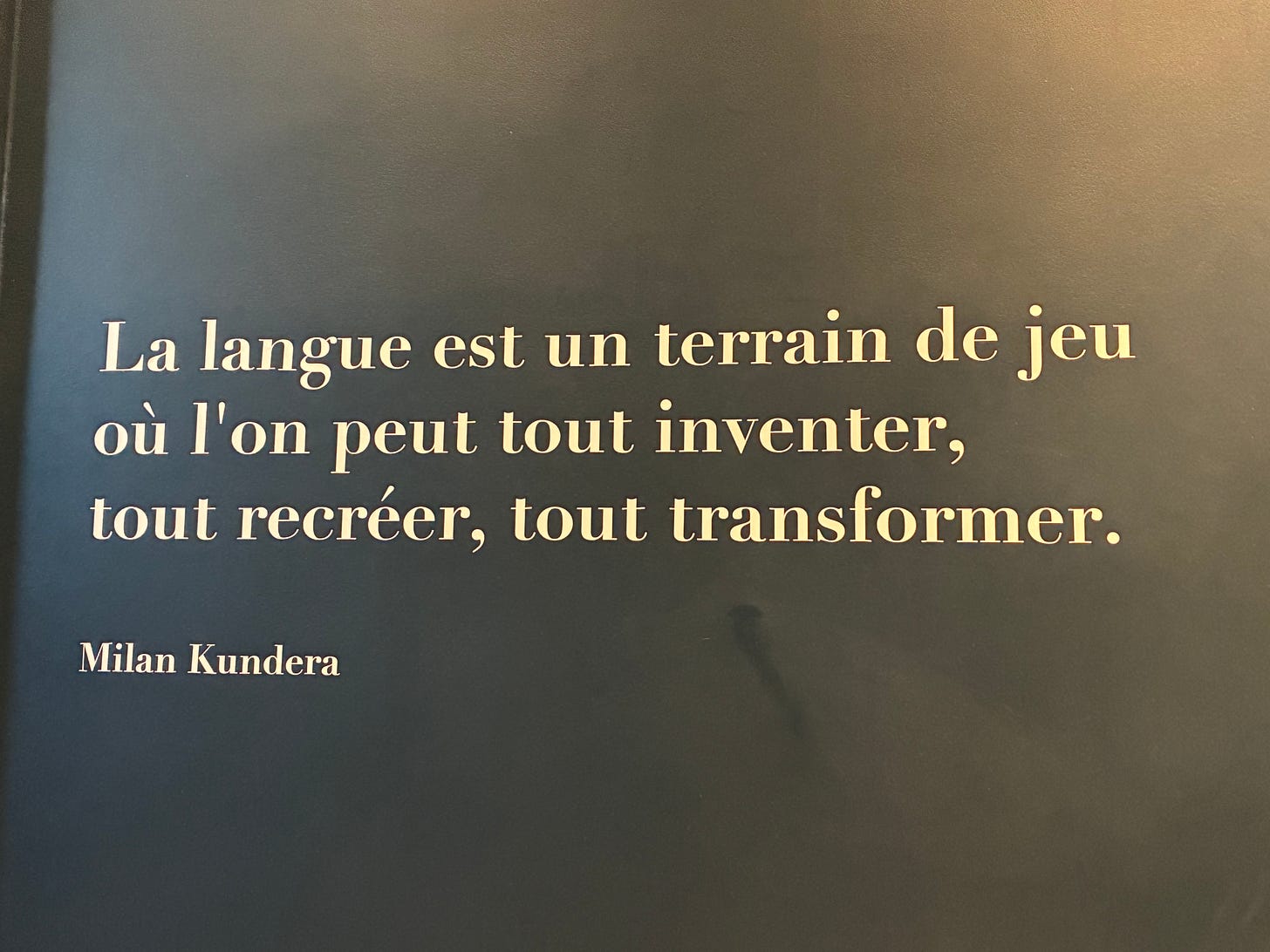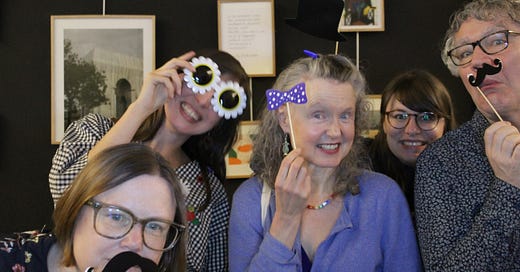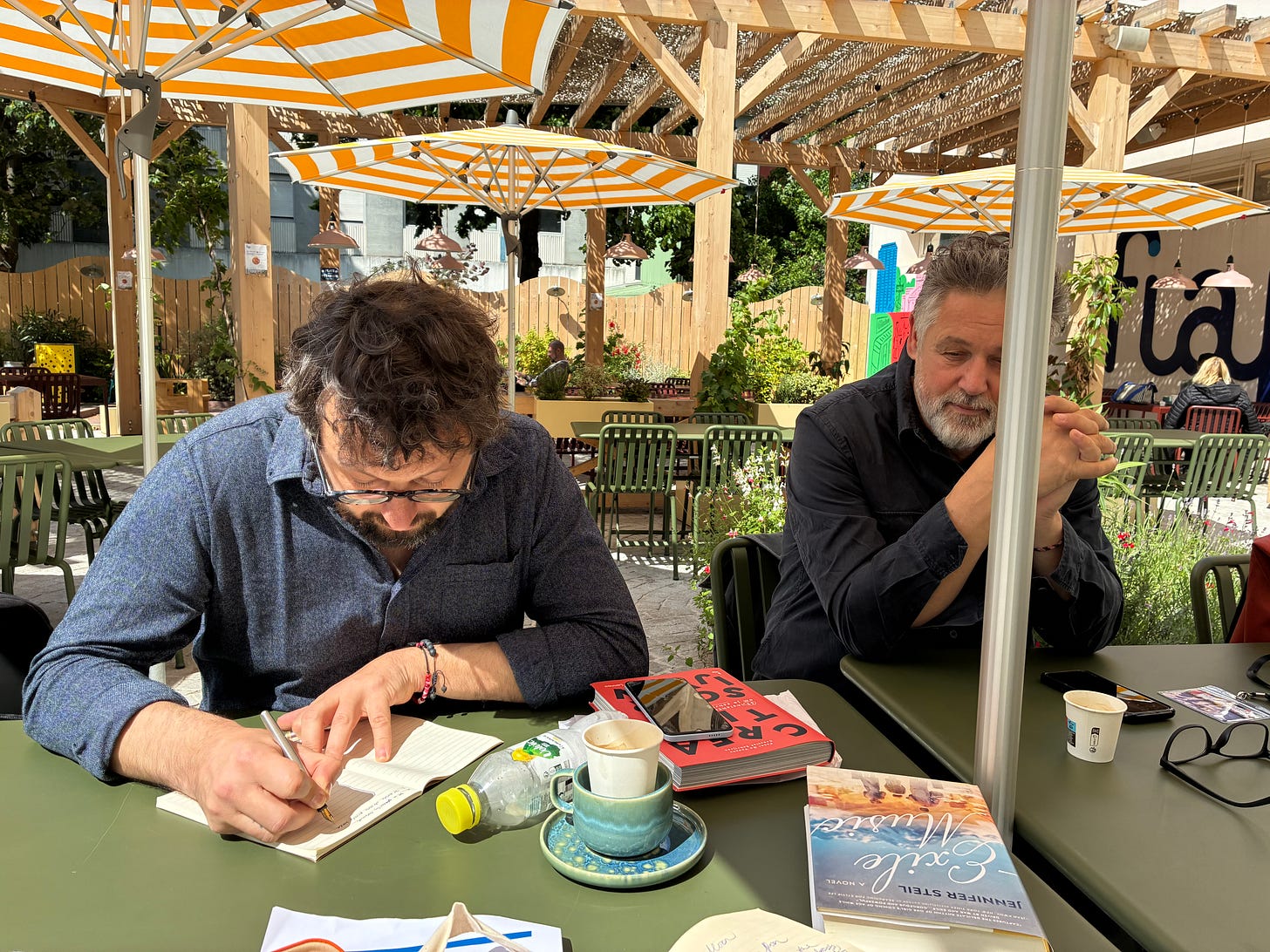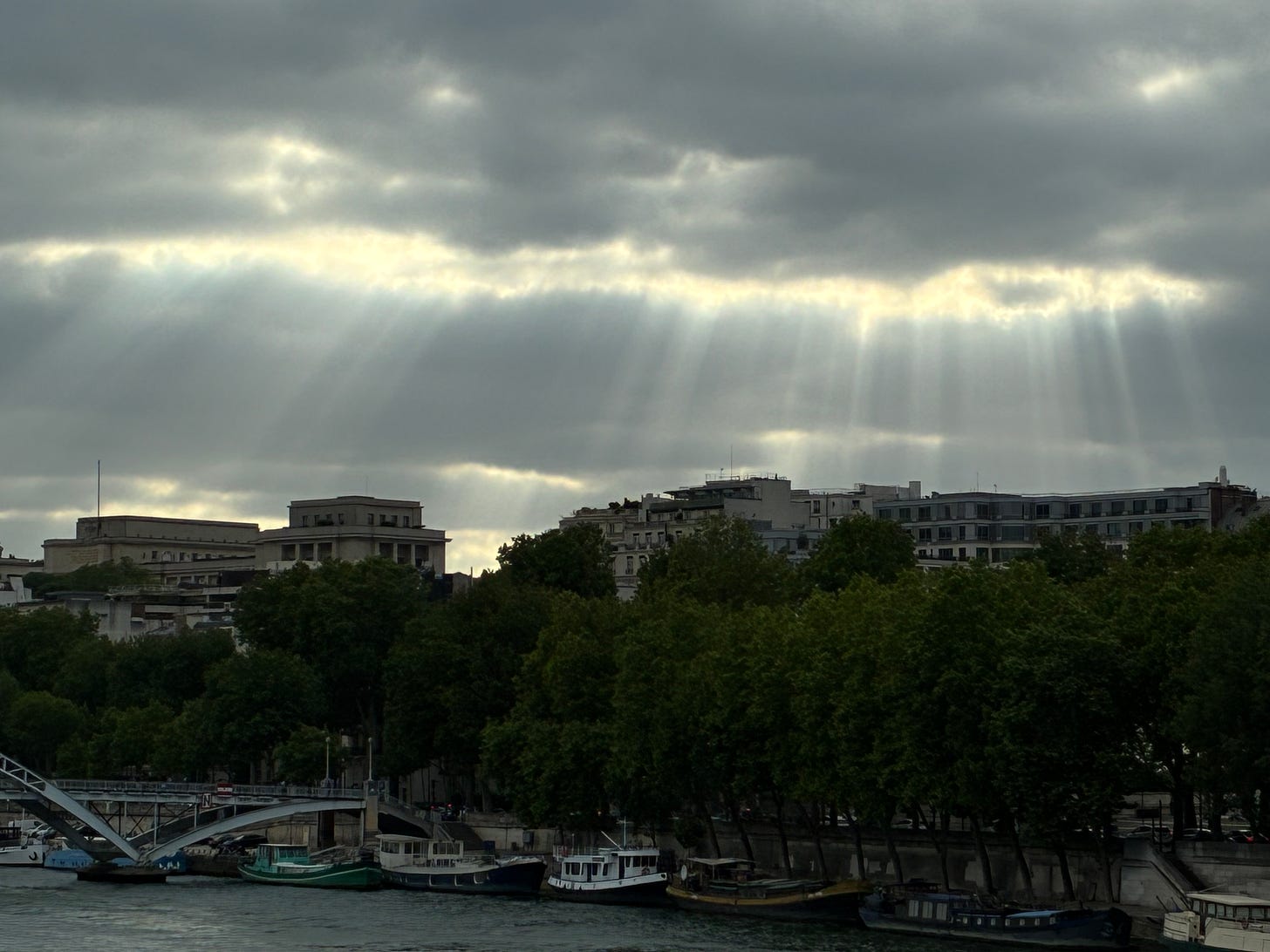Reigniting the internal pilot light (and a bit of cancer news)
“The purpose of art is washing the dust of daily life off our souls.” Pablo Picasso
I have so much to tell you this week that it will never squeeze into one post. This past weekend at the conference of the European Association of Creative Writing Programmes in Paris showered me with so many creative ideas that it will take me weeks to share them all (or at least the top ten) with you. I’m excited!
This week, I’ll tell you a bit about the journey and an overview of the conference, and next week I’ll dive into the specifics I believe will interest and inspire you. Next week, I want to talk about how creative writing is saving Ukrainians. And perhaps the power of ecopoetry. Or some thoughts on generating writing from soundscapes.
On the train north, I received a text from my friend Ana, alerting me to the results of a new Merck study on the immune-boosting drug Keytruda/pembrolizumab for ovarian cancer. It found that Keytruda extended “progression-free survival” in all comers. Shortly thereafter, two other friends emailed me the same study. A glimmer of hope! The drug is not yet approved for ovarian cancer, but I wrote to my oncologist to ask if I could receive it on “compassionate grounds,” which is sometimes possible. Please cross your fingers.
I’ve been wondering if the reason doctors who treat ovarian cancer patients are so brusque is that they lose all of them. They are fed up with all the dying; they don’t have the emotional resources to get attached, to empathize. “You’re going to die anyway, don’t waste my time with all of your nonsensical ideas about how to prolong your life,” is the attitude. “We’ll just do the conventional things we’ve been doing forever that won’t ultimately save you, and that’s it.”
I had been anxious and grumpy, worried about the extra weight on my healing foot as I walked up and down stairs carrying luggage. But Ana’s text buoyed me. Upon arrival, I tried to buy a Metro pass (Navigo) from a machine in the Gare de Lyon, but it kept having technical failures. Annoyed, I got in line for the ticket window with a live person. I told her what I wanted and she said, “if you buy a week pass it’s much cheaper.” Her advice ended up saving me more than 30 euros. Which is another argument for humans over machines. She was so helpful and friendly that I left buoyed. I had only been in Paris ten minutes and already a human interaction had cheered me. It doesn’t take much. (I don’t understand the reputation Parisiens have for rudeness; they are almost always kind and generous with me).
I arrived at my shitty little hotel braced for disappointment, which is inevitable when you have reserved the cheapest room available at the last minute. I can’t plan anything in advance, never knowing if I will be well enough to travel. I’ve been lucky the last couple of Paris visits. But this time, the only thing my tiny, charmless room had to recommend it was that there was a tiny desk. Not enough room for yoga. (Unless I closed the bathroom door and squeezed next to the bed, adjusting myself constantly to avoid hitting the bed or the desk, which of course is what I did). But I was not in Paris for the room; I was in Paris to meet one of my favorite liminal families.
Having arrived late because of my hospital appointment in the morning, I rushed to try to find everyone. I had already missed a boat ride with them, but I hoped to catch them as they disembarked. I stood at the quai for half an hour, but no one familiar emerged. I wasn’t too disappointed, because by then the exhaustion was setting in. I had been up since before 6 am to get ready for Avastin treatment. I probably wasn’t fit for human company. I turned and began walking home. Two people stopped me to ask for directions. French people! I was pleased that I looked local, although I could never achieve Parisienne chic, certainly not in my grubby travel attire. Back at the hotel, I barely stayed awake long enough to wash my face and brush my teeth, forgetting about dinner.
At breakfast, when asked if I wanted croissants or bread (the only options, because what else could you possibly want?), I said I couldn’t eat gluten. The young woman sitting alone at the table next to me smiled at me and said, “C’est compliqué, non? When you can’t eat gluten here?” We chatted a bit and I was grateful for her understanding. Rather than hating me for being difficult. Which people do, I’m sure. A man at a nearby table in black jeans and button-down shirt started rocking out, singing along with the music playing, fists in the air. When I looked over, he said, “ça ne te derange pas?”(“This doesn’t bother you?”) Not at all! I answered. Sing! So he continued to do so, to the mortification of his teenage daughter across the table.
I walked to the conference in glorious spring sunshine, down a leafy green avenue lined with farmers’ market tables. I wandered past the beautiful vegetables and cheese, and found myself unable to resist the cherries. I bought a half kilo for breakfast.
It’s impossible to explain the magic of this group of people, but I must try. These are writers of every kind, from across Europe and beyond, who are also involved in education of some kind. Professors, editors, lit mag publishers. Novelists, short story writers, poets, nonfiction writers. Many of them I have known since I joined in 2017 or so. Every workshop included writing. We wrote our way through the days, sharing techniques and ideas. In the first workshop, I found myself sitting beside a French writer who lives in Montpellier! I mean, what are the chances?
During the coffee break, so many people kept greeting and hugging me that I didn’t make it to the coffee until it was all gone. Frankly, the people were so energizing I didn’t need it anymore. My internal pilot light reignited.
I have so much to say about all of the sessions and the people in them. I nearly filled a notebook. Such a luxury, to scribble alongside my people.
The first day alone would have been worth the trip. I only missed one session, because I was having coffee with my Belgian friend Peter in the sunny courtyard, and he suggested we keep talking, and I said okay, but you have to help me with a flash fiction piece I need to submit by midnight tonight. (A piece I wrote for an international contest just won second place, meaning I progressed to the final round of flash writing). Peter gave me a series of prompts to help me shape the story. When I was writing away, he began helping a writer from Baltimore. Once she was writing, he began helping a Spanish poet. People drifted over. I left with two new drafts. It was a very productive private workshop.
I had forgotten why I loved Peter so much. It has been years since we have seen each other. But now I remember! He’s funny and smart. He draws out my own humor. I am my best self in the company of these EACWP writers, all of whom dwell in liminal space. So many are living in countries they were not born in, so many speak multiple languages, so many are precariously perched between jobs, so many live on the page as much as they do on earth.
The final evening, there was a birthday party at the offices of Aleph Ecriture, a Parisien creative writing school that is celebrating 40 years of teaching. I met still more writers. It was impossible to meet everyone! Talked with a German writer who just lost her job in Ireland to AI. She was writing stories regularly for an educational program, and was let go when they decided it was more cost effective to have AI write the stories. Everything authors are afraid of with AI is already happening, she said, has already happened.

The morning after, I thought I would wake up feeling bereft, but instead I still felt full of joy, inspiration, and warmth. I couldn’t stop writing.
I returned to my home office to find a pile of D&D dice next to my computer. My last morning in Paris Theo rang me, full of happiness after having played Dungeons and Dragons (essentially a storytelling game) with one of her best friends from Uzbekistan, who now lives in the US (they used to play together in Tashkent). It was so good to talk with people who don’t make me feel weird, who engage with my weirdness and are weird themselves, Theo said. She told me all about the funny things they had invented together. I told her a little about my conference, how I felt similarly, that I was with people who understood me. It’s rare we have moments of mutual euphoria these days, so I treasured this.
Recently, Theo was despairing over her future and I said, “Theo you are going to have an amazing life. I know you are. You have an incredible future ahead of you.” And she said, “Not if you die. It won’t be amazing if you die.”
I told her about the Keytruda study and that I was hopeful. I don’t want to keep her from having an amazing life.
It helps that since the conference my stomach pain has lessened dramatically. For the first time in months. Avastin? Or the curative powers of my literary community? Something magical has clearly happened.
I am amazed by the power of the EACWP gathering to stay with me even now, to keep me suffused with hope and purpose. I am awake and alive in a way I haven’t felt in a long time. Theo just rang to talk over issues with the play she is writing, and it was a deep pleasure to talk writing with her. I suspect she may already be a better writer than I am. Her writing always surprises me, makes me laugh, and moves me.
Who am I going to do this with? she asked, when the prospect of my death came up again, as it too often does. “I rely on you for writing advice! And who will tell me where to submit? Where to publish?”
I laughed. “Oh, you will have no shortage of people to talk with you about writing,” I reassured her. “I will write you a list. So many of my friends are writers, and many have already told me that they will help you in whatever way you need after I am gone.”
Right?
A few bits of housekeeping:
If you are a writer and educator in Europe and are not a member of the EACWP, please join us:
https://eacwp.org/
Please share Liminal with any friends you think might enjoy or need it. It’s one of my only sources of income while in treatment. (Although free subscribers also very welcome! I get it, times are tough! I accept all comers.)








Glad to hear about this possibility of keytruda. Excellent news. And the conference sounds great, quite a contrast with my experience in the French university system. Thanks for the link. I'll join EACWP.
Jennifer, that conference sounds like the best medicine! My father in law takes keytruda and is in remission for years from it, living his best life. I hope you can use it and get benefits too.